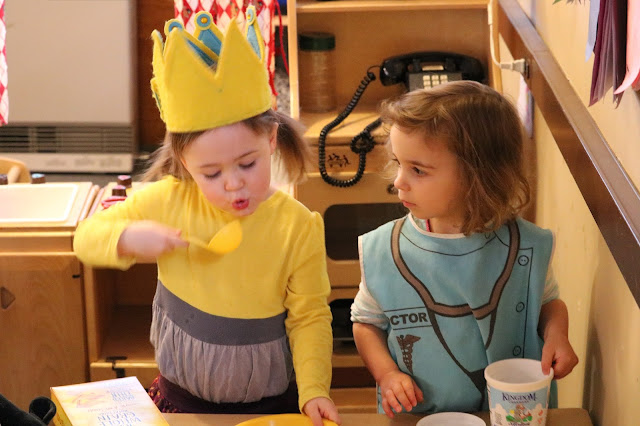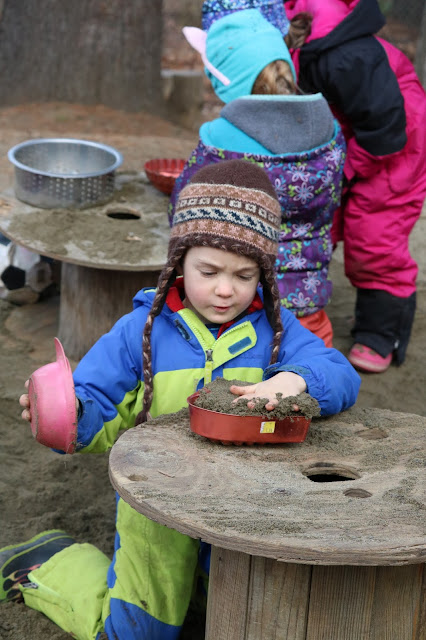It's that time of year again when everyone's nose starts running... and running... and running. In the scope of children's daily lives, how we keep those noses clean might seem like a trivial thing, but at MVS we think it's actually a pretty big deal. Sometimes when an adult tries to help clean a child's nose, the adult holds the child's head still and quickly swipes a tissue across their face, then both child and adult continue on their merry ways. But if you were the child in that situation, how would that make you feel? Your nose is clean but having someone touch your face is a rather intimate interaction; it's just been rushed through and you're expected to brush it off and move on.
The good news is that there is another way. Rather than hurriedly imposing our priority of nose wiping on the child, we can instead offer to help, invite the child's participation in the task, and share in the comfort of helping someone in a way that is respectful and reciprocal. Given the choice, after all, most children would choose to have a clean nose rather than a drippy one, and I've found that when I approach them with an offer ("Would you like me to help you clean your nose?") rather than a directive ("Hold still so I can clean your nose"), they are usually willing to participate. I make eye contact with the child, talk to them about what I'd like to do, wait for them to respond either verbally or with a gesture, and then respond to their response. Around age one and a half lots of children are pretty capable of cleaning their own noses if given the opportunity; often I'll do the first wipe, then ask if they'd like to try wiping it themselves.
On the adult side these reciprocal interactions take patience, concentration, and a willingness to trust the child and take the time to slow down with him or her. I realize that these are not easy things to summon up at the end of a long work day or, for teachers, in the middle of a frenzied afternoon. But I truly think that they are worth it both for the child and for the adult. Personally, reciprocal and respectful caregiving interactions make me feel fulfilled and satisfied as a caregiver, and for every parent who has said "I don't know how you do what you do all day"–this is actually the answer! There is so much joy to be found in reciprocal interactions where participation is truly shared between adults and children. And now I realize that I should have titled this post "Finding Joy in Wiping Your Child's Nose."
Some wonderful writing about wiping noses and other routine care interactions is available here (includes a video!) and here, from Janet Lansbury.
Thanks for reading,
Megan
News and Reminders
We will be closed this Thursday and Friday, November 23 and 24. Happy Thanksgiving!
Classroom Updates
Infant I
This week our older children were able to spend lots of time with the Infant II children, both in their classroom and outside. We love watching how behaviors change when these age groups are combined. On Thursday morning we joined Infant II for painting, and our children were just as happy to observe how the older group used paint as they were to explore it themselves. Another time our children inspired a group of Infant II walkers to crawl around on the floor instead. And we are careful to monitor social interactions between these groups, but the majority of them are truly positive. Our younger children had a great week, again pretty calm and settled. Some of them experienced snow for the first time; reactions ranged from sticking their tongue out at it to seeking shelter in a teacher's arms. Looking forward to lots more snow ahead!
Infant II
We had a wonderful week and had a couple of quiet days on Monday and Tuesday. As the week went on the children became more active in their play. We finger painted our placemats with fall colors, which the children enjoyed. On Wednesday we explored with the sand in a small container. The children liked scooping it up with their hands then putting it on the floor. Eventually, the whole container was dumped out on the floor for free exploration. They liked walking on it, sliding their feet through it, and tossing it around. It was pretty exciting! We also worked very hard on cleaning up this week and noticed that the children respond better when we work with them to clean up one-on-one rather than as a whole group. Finally, our children are definitely getting used to moving around in their snowsuits, which helps everyone stay happy and warm!
Toddlers
We had a good week in our classroom. We put up twinkly lights and the children were very excited. V positioned her baby doll to "watch the lights" as she excitedly told her what was happening. We also put in a corner desk with a small library and some harvest pumpkins to celebrate the upcoming Thanksgiving holiday, and we worked hard on our Turkey Day placemats with children both fingerpainting and using paintbrushes to create some wonderful artwork for the holiday. This week we worked hard at keeping our mittens on our hands outside. We strongly recommend the Stonz mittens with thumbholes for children who struggle with keeping their mittens on outside. As we head into the colder months the proper mittens are very important to keep hands toasty warm.
Preschool I
This week was full of change and surprises! We had multiple visits from some younger 2-year-olds from the toddler room and another birthday–the big 3! Both Shannons were impressed at how welcoming the children were towards their younger friends, and how resilient and flexible they were when the daily routine was tweaked here and there. We also took a few hikes to Campfire Forest; one excursion there lasted over an hour. The children also asked about the bus stop (the stop sign at the end of Thomas Lane), so we took a short walk to check it out. Short excursions like this are excellent scaffolding experience to foster group management strategies for future field trips. We hold hands or link arms to walk across driveways, roads and parking lots. The children are tasked with different ways of moving from lamp post to lamp post–hopping, running, or skipping. Skipping proved to be very complex. If the children show interest, we may work on that more next week!
Sorry we don't have updates this week from PS2 or PreK, but here are some pictures instead! Featuring another great trip to ECHO.
 |
| Pretending to be chameleons. There are two children standing in this photo but you probably can't see them. |
 |
| Another chameleon here too. |
































Comments
Post a Comment